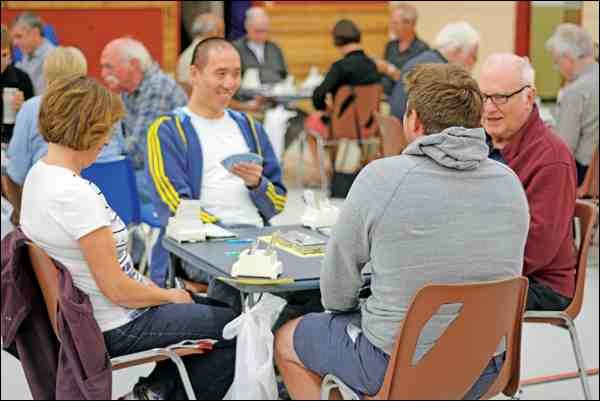Bridge players from all over Western Canada travelled to Meota to compete in the Jackfish Lake Sectional duplicate bridge tournament last weekend.
The American Contract Bridge League sponsored tournament was hosted by the Meota and North Battleford bridge clubs.
"For the past 15 years, we've had this tournament which is recognized as one of the best as far as hospitality is concerned, friendliness is concerned, the food that we supply because people really talk about it," said club president Gerry Fernandes. "It's recognized all over."
This year's tournament has players from the host clubs, Regina, Saskatoon, Edmonton, Alta. and Red Deer, Alta. - just to name a few places. One player who recently moved to Nanaimo, B.C. from Edmonton flew back specifically for this tournament. Prior to her move, she attended the past six or seven sectionals. She said the good people and endless supply of home cooking keep her coming back to the event.
The tournament organizers - who prefer to be called "chairs," joked Fernandes - said plenty of planning goes into hosting a tournament like this in a small community.
"Other tournaments where you run them in the city, people just come and get a hotel room and go to restaurants," says tournament chairperson Ray Davie, who organizes the event with his wife Marnie. "But here, we have to arrange beds and breakfasts, cabin rentals, arrange for the catering of the Saturday meal. Friday we are lucky enough that we can go to the [Meota Hotel and] Steak Pit here, but Saturday we have to feed everybody. Sunday we have to feed everybody."
"It's a lot of work compared to other places," he added.
Attendees of the tournament say it is one of the most hospitable and friendly bridge tournaments offered in Western Canada. Davie said part of that comes from necessity because of a lack of amenities available on the weekend.
Davie added that tournaments in the bigger cities are becoming more scarce because of the cost of operations and players cannot afford the rising costs of hotel rentals.
The cost is significant because all player travel expenses come out of their own pocket. There is no money on the line at the tournaments, just tiers of points towards climbing the ranks towards earning the title of life master. The four tiers, beginning with the lowest tier, are black points, red points, silver points and gold points. As a sectional tournament, the prize is earned in red points.
Duplicate bridge is different than what Fernandes and vice-president of the Meota chapter Jim Hamilton referred to as kitchen bridge. In duplicate bridge, every table at the event plays the same hand. The cards are dealt out prior to the event and placed on boards. Once the hand is completed, the cards are back on the board and the players rotate. It allows for the tournament to be contested between everyone at the event, not just the table. Hamilton compared it to a stroke play golf tournament. While there is an individual game at the table, the total points are ranked amongst everyone in attendance.
"You're playing against 15 other pairs," Hamilton added.
The two host clubs - Meota and North Battleford, which are part of the Northern Saskatchewan Unit 575 - play club games Tuesday and Thursday nights respectively. Meota charges $3, while North Battleford charges $4. None of the money earned at these nights goes towards paying members of the committee. They all volunteer their time. The money charged is used to cover the cost of renting the hall. The remaining money goes toward paying the ACBL dues.
The North Battleford club was founded in the 1960s, while the Meota club was officially launched in late 2004 to early 2005. Prior to the foundation, players in the community would play amongst friends and families on their own.
While the club averages four to eight tables per meeting, Fernandes and Hamilton have noticed the numbers have been decreasing.
"Things have kind of dwindled away simply because we can't find these young people to come out and participate," said Hamilton.
Hamilton added anybody is capable of learning the game. The club is willing to teach interested players how to play bridge, whether they have a partner or not. He said if they did not have a partner, the club would make accommodations.
"We would be delighted to see them," added Fernandes of novices trying to get into bridge. "We will make every effort to accommodate them."
As Hamilton said, a large number of bridge players between the two clubs are retired. He said they would welcome taking time to teach newcomers the game.
"For example," he said, "if two or three people get together and show a little bit of interest in bridge and they have two to three hours on Monday night, we can accommodate somebody that would be more than willing to invite you over to their home."
It continues the tradition of hospitality in bridge, like the Jackfish Lake Sectionals displays every year. However, a big part of the reason he enjoys bridge and the reason he says people will become addicted to the game once they try it is the competitiveness.
"If you like a challenge, this is a great challenge," said Hamilton. "If you like the analytical part of the game, this is the game for you. It really can become very competitive."

